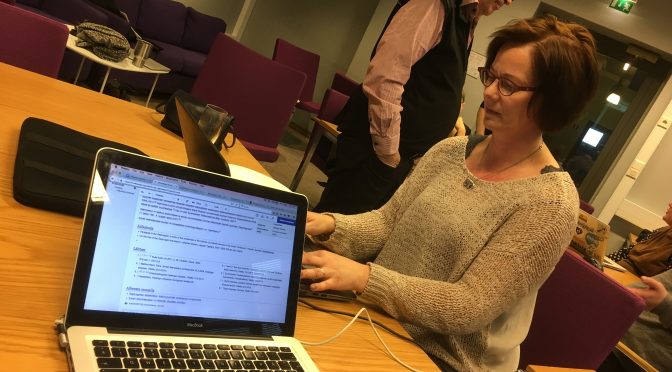By Rick Bonnie and Helen Dixon
Last week Friday’s Wikipedia edit-a-thon on “Women and the bible” was a great success. The edit-a-thon was organized by the CSTT and was open for all faculty and students of Helsinki’s Faculty of Theology. (If you’re unfamiliar with what an “edit-a-thon” is and would like to know more, check out this site.) And, though we were only around a dozen in number, the participants from Theology and the volunteers of Wikimedia Suomi created and edited around a dozen of entries in the Finnish and English Wikipedia.
Since the start of Wikipedia in 2001, men have dominated its scene. Recent numbers suggest that around 90 per cent of Wikipedia’s editors and volunteers are men. While any voluntary work to spread free knowledge to the world through the internet is most surely appreciated, the consequences of such a strong gender imbalance abound. There are likely various reasons causing this imbalance and Wikipedia is strongly developing efforts to shift it (see, for example the “Wiki Loves Women” initiative focusing on Sub-Saharan African women: wikiloveswomen.org); yet, the outcome of this imbalance means that there’s a significant bias to the manner in which articles have appeared and are being updated on Wikipedia. Such a bias has an even more profound impact on the pages written in smaller language communities like Finnish.

Wikipedia is the largest encyclopedia in the world (see the visualization here for current edits taking place in the world), very easy to access, and completely free to use. It’s no wonder that Wikipedia has become the most used source of information by high school pupils and university students, and likely by others too. Given its strong impact upon our society, addressing the profound gender imbalance in its articles is of high importance and significance.
Last Friday’s push to challenge the gender imbalance may have been small compared to the ocean of pages available on Wikipedia, but it provided an opportunity to introduce its importance to researchers and to give guidance on how to edit Wikipedia entries. In the meanwhile, we were able to make headway on several important, but underrepresented subjects related to “Women and the bible.” To give some examples, Raija Sollamo, the first female professor in Theology in Finland, now has her own English Wikipedia page, as well as her student Jutta Jokiranta, the current president of the International Organization of Qumran Studies. And, thanks to Wikipedia Suomi, we were able to make a Wikipedia page that lists all entries on female biblical figures not available (yet!) on the Finnish Wikipedia pages.
We invite all Finns to make these biblical women – and the women who study the bible and its reception – visible on Wikipedia!
Finally, we thank all the participants for their hard editing work and the volunteer trainers of Wikimedia Suomi for all their guidance.

